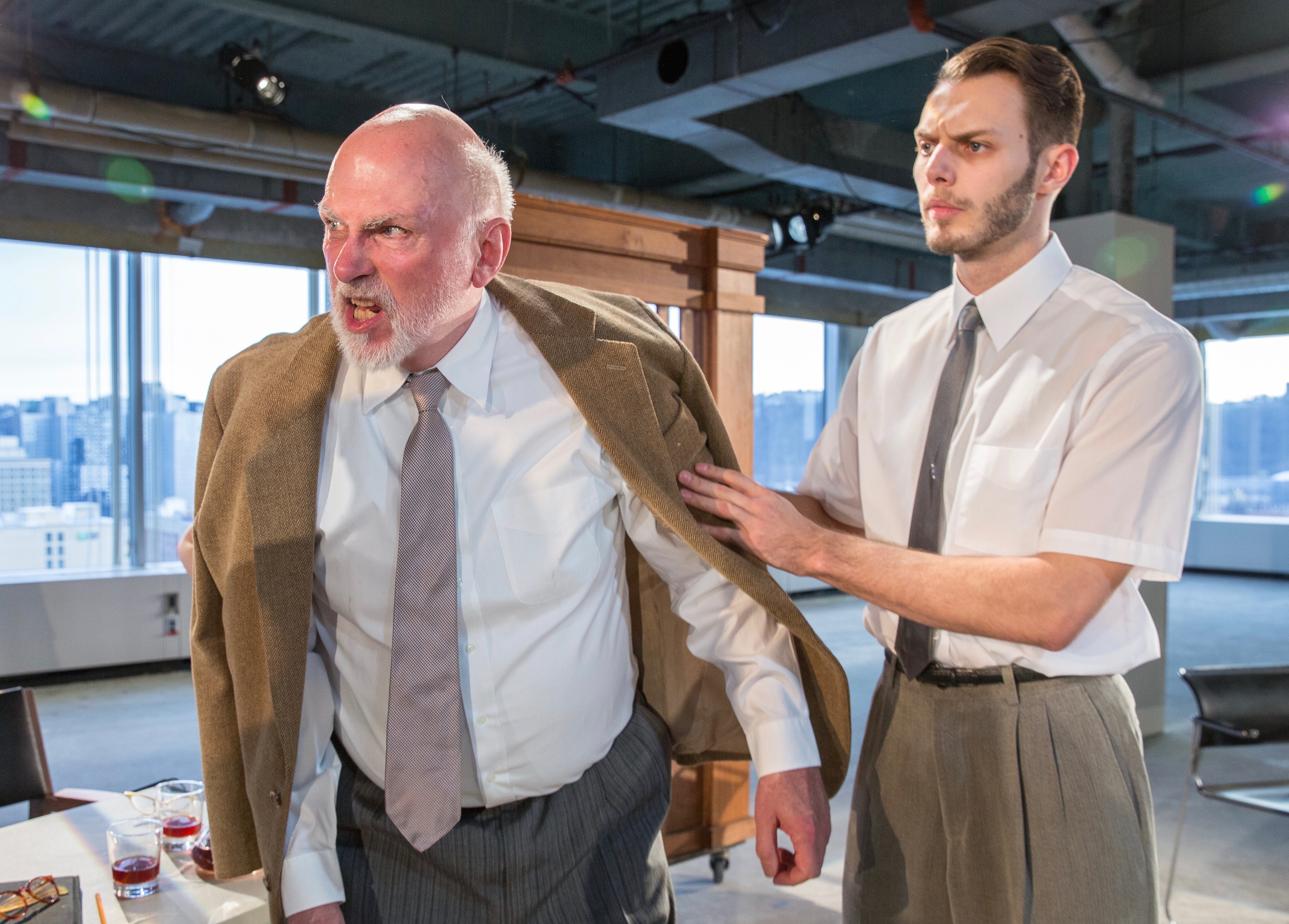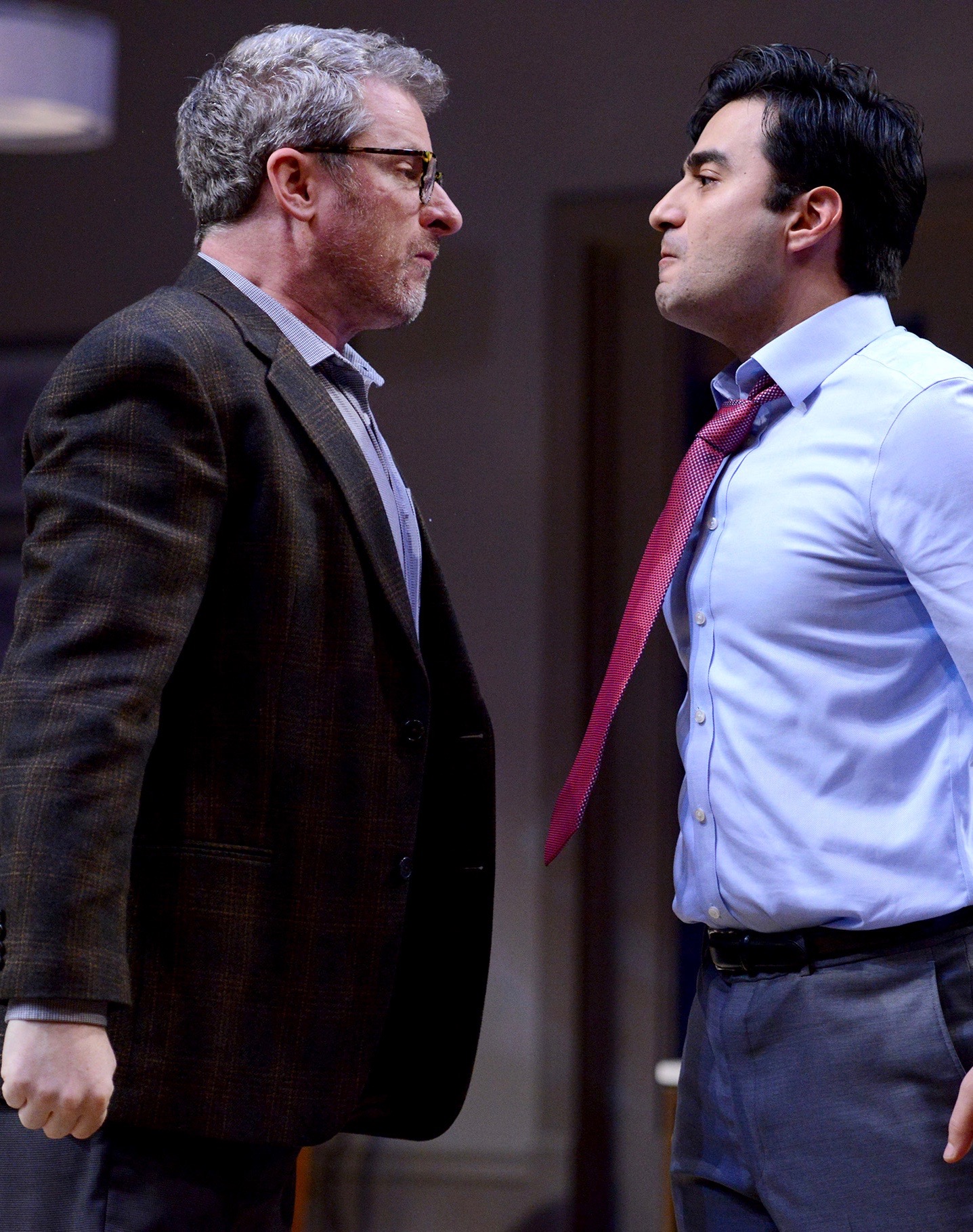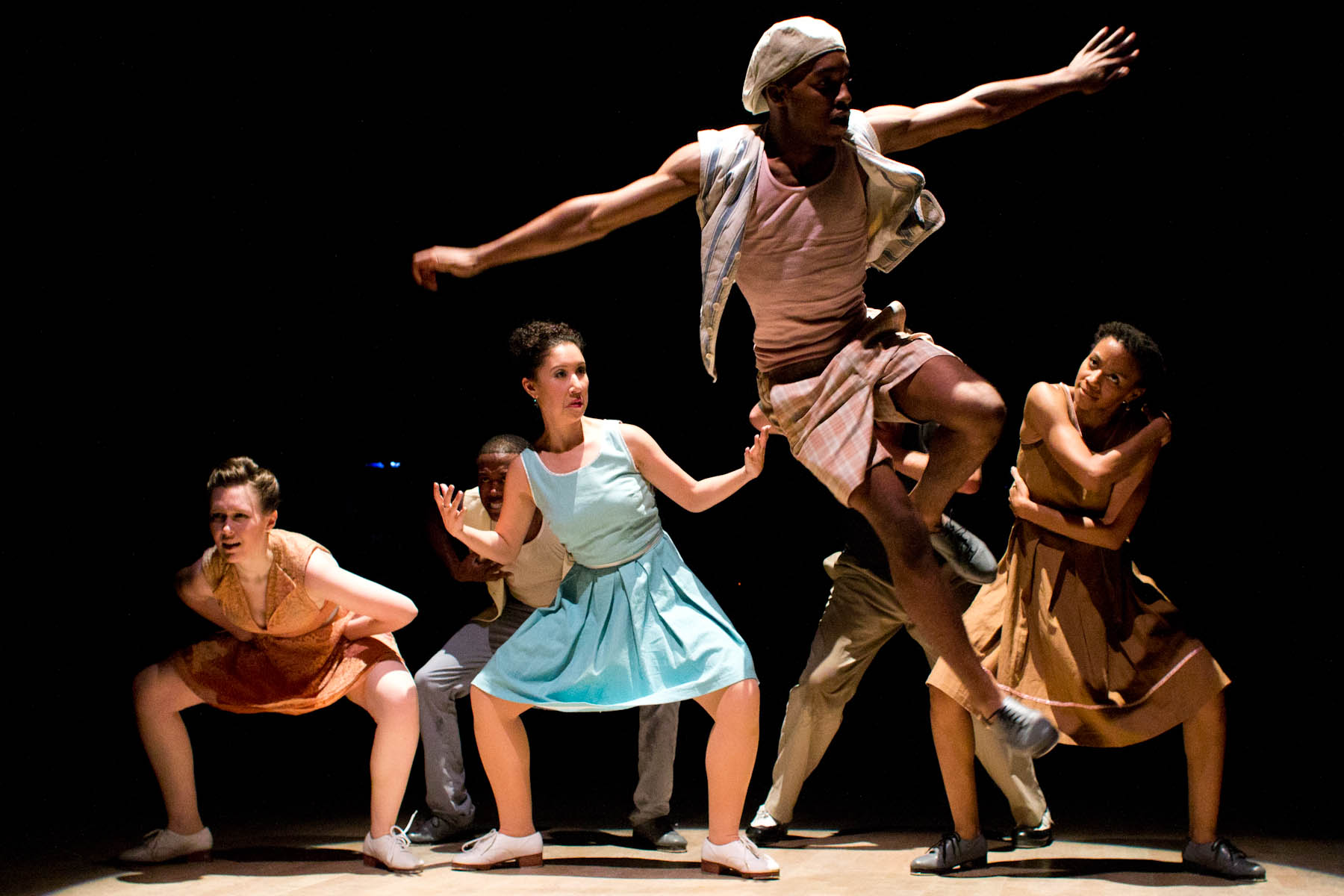April Theater Preview: Updated Classics and Big Prizewinners
- Like
- Digg
- Del
- Tumblr
- VKontakte
- Buffer
- Love This
- Odnoklassniki
- Meneame
- Blogger
- Amazon
- Yahoo Mail
- Gmail
- AOL
- Newsvine
- HackerNews
- Evernote
- MySpace
- Mail.ru
- Viadeo
- Line
- Comments
- Yummly
- SMS
- Viber
- Telegram
- Subscribe
- Skype
- Facebook Messenger
- Kakao
- LiveJournal
- Yammer
- Edgar
- Fintel
- Mix
- Instapaper
- Copy Link

Old passions erupt in new form in Ibsen’s “The Master Builder” at Quantum Theatre. Here, inflamed papa Knut Brovik (John Reilly, L) gets the chill-it handle from son Ragnar (Thomas Constantine Moore).
Okay, Pittsburgh’s theater and performing-arts companies don’t intentionally organize their schedules around a theme every month. But often—for reasons beyond logical analysis—particular types of shows turn out to dominate the mixture, and such is the case in April.
This month’s slate is headlined by some major prizewinners, along with unusually many revivals and updates of old classics. We have not one but two recent Pulitzer Prize-winning plays, the 2013 winner Disgraced and 2014’s The Flick, plus a Tony Award-winning Best Musical in Nine. In the classics department we have Rossini’s opera The Barber of Seville, Ibsen’s mega-drama The Master Builder, Sarah Ruhl’s modern take-off on the mythical Eurydice, the Strindberg-inspired Miss Julie, Clarissa and John, a multimedia upgrade of Flaminio Scala’s The Plague in Venice … and (granted, they’re not that old, but they’re already classics) One Flew Over the Cuckoo’s Nest and Grease.
As always, plenty of less-heralded but promising new works are on tap as well. Notable numbers here include White Rabbit Red Rabbit, Laws of Attraction, The Last Match, and—for symmetry—First Date. All shows are previewed in order of run dates.
Opened in March and continuing into April:
MISS JULIE, CLARISSA AND JOHN by Mark Clayton Southers. Through Apr. 2, Pittsburgh Playwrights Theatre Company.
Pittsburgh Playwrights Theatre Company, best known for staging the works of August Wilson, has extended the run of a new hometown original that riffs on a Swedish classic. The play is Miss Julie, Clarissa and John. Written by PPTCO founder Mark Clayton Southers, it is a re-conception of August Strindberg’s 1888 drama Miss Julie. Southers has kept the core dynamics of Strindberg’s plot. We still have Julie, a woman from an aristocratic family, falling perilously in love with a servant. But here, the setting is moved from Sweden to a Virginia plantation during Reconstruction. Not only is the servant of a different social class than Miss Julie, he’s of a different color. Other new twists are added, and while the Strindberg play was a barn-burner to begin with, Southers’ Americanized Julie has been heating up the boards quite vigorously. 937 Liberty Ave., Cultural District.
SEX WITH STRANGERS by Laura Eason. Through Apr. 3, City Theatre.
Try this instant personality test. Read the title of the play finishing its run at City Theatre—Sex with Strangers—then ask yourself: Does the notion strike you as (a) arousing, or (b) creepy? For the woman in Laura Eason’s play, the answer is (c) both. The woman is a struggling middle-aged novelist whose first book laid an egg. Into her life comes a stranger: a younger man, also an author, whose first opus went viral on the Internet. It happened to be the imaginary (or maybe not so imaginary) digital diary of a young man who sets out to have sex with lots of women and succeeds. Do the two writers engage in writerly intercourse? Of course, and Sex with Strangers is not for children, regardless of how cyber-savvy they may be. 1300 Bingham St., South Side.
RIGHT OF WAY (dance/performance) by Beth Corning. Through Apr. 3, Corningworks.
Beth Corning is at it again. The choreographer and dancer has put together another feature-length performance piece that plays on the fundamental absurdities of modern life. Her co-creator this time is the magnificently named and stupendously entertaining drag-queen performer Jezebel Bebbington D’Opulence. Title of the piece? Right of Way. And the issue explored by Beth and Jezebel as they cavort through the evening is: Who has the right to say whose gender role (or for that matter, gender, period) is right for whom? Right of Way is the latest emanation of the Corningworks Glue Factory Project. It has a short run so you will need to catch it while it’s hot, before the glue dries. At the New Hazlett Theater, 6 Allegheny Square East, North Side.

Isaac (Ryan McCarthy) and Amir (Fajer Kaisi) lead with their chins in The Public’s “Disgraced.”
DISGRACED by Ayad Akhtar. Now through Apr. 10, Pittsburgh Public Theater.
Much of the buzz about Ayad Akhtar’s play Disgraced has focused on its hot-button subject matter. The central theme is Islamophobia, but many other forms of prejudice and social tension are explored. The play’s setup sounds like a crude ethnic joke—a lapsed Muslim, a Jew, an African American woman, and a blonde get together for a dinner party—and though they’re all highly educated, progressive people, the talk turns heated and the knives come out.
Disgraced, now being given its local premiere by Pittsburgh Public Theater, won the 2013 Pulitzer Prize for Drama. And the play is more than socially relevant: It’s a riveting personal drama (see our review). The main character is a lawyer of Pakistani descent whose fast-track career has been interrupted when he is suspected of sympathizing with Islamic terrorists. At the O’Reilly Theater, 621 Penn Ave., Cultural District.
New shows in April:

Dorrance Dance brings extreme tap to the Byham Theater stage.
DORRANCE DANCE (modern dance). Apr. 2 only, presented by Pittsburgh Dance Council.
Pittsburgh Dance Council brings notable modern-dance companies to town, and the latest to visit is a fast-rising new troupe, New York City’s Dorrance Dance. These folks are tap dancers, led by founder and artistic director Michelle Dorrance. Raised in North Carolina, Dorrance had classical training as a child—her mother was a professional ballet dancer and founder of the Ballet School of Chapel Hill—then went on to hoof with some of the greatest before starting her own company five years ago. (She has danced with artists ranging from tap maestro Savion Glover to the swing-rockers Squirrel Nut Zippers.) Tap seems to be more vibrant than ever these days and Dorrance Dance exemplifies the form’s new directions, bringing a wide mix of eclectic influences to the party. 8 p.m. Byham Theater, 101 6th St., Cultural District.
THE BARBER OF SEVILLE (opera) by Gioachino Rossini. Apr. 2-10, Pittsburgh Opera.
Amazing as it may sound, there are reported to be consumers of culture in our fair city who have gone through life without attending an opera. These poor souls need languish no longer in deprivation. Pittsburgh Opera is mounting the comic opera said to be ideal for first-timers, Gioachino Rossini’s The Barber of Seville. The barber in question is none other than the immortal Figaro—just about anyone can sing along with “Figaro, Figaro, Figaro!” And as the video excerpt above shows, this opera also features a formidable femme fatale. (That’s Corrie Stallings as Rosina, while Jonathan Beyer sings the title role.) If you don’t speak Italian, no problem: Pittsburgh Opera is staging The Barber of Seville with a line-by-line English translation projected throughout the show. As for the plot, there are romantic intrigues and complications, but the barber sees that we get a happy ending. He’s no Sweeney Todd, he is Figaro. At Benedum Center, 237 7th St., Cultural District.
NINE (musical) by Arthur Kopit and Maury Yeston. Apr. 7-17, University of Pittsburgh Theatre Arts.
To film buffs, Federico Fellini’s 8½ is a work of cinematic genius, a surreal journey through the dreamlike world of movie-making itself. And there is also a play—a musical, no less—that takes the 8½ story half a notch further. It’s called Nine. Written by Arthur Kopit and Maury Yeston, it won the 1982 Tony Award for Best Musical, and Pitt’s Department of Theatre Arts is performing Nine to wrap up its Mainstage season with a bang. As in Fellini’s semi-autobiographical opus, you’ve got the famous Italian filmmaker who is suffering from writer’s block while beset by glamorous women and flashbacks of his past life. Nine amps up the action with songs like “A Call from the Vatican,” “Be Italian,” and (ominously) “I Can’t Make This Movie!” The Pitt production goes further still, adding a guest appearance by Kathleen Humphrey, whose credentials are impeccable: She is Senior Vice Chancellor of the University of Pittsburgh. In the Charity Randall Theatre at the Stephen Foster Memorial, 4301 Forbes Ave., Oakland.
THE PLAGUE IN VENICE by Flaminio Scala. Apr. 7-9 and 19-23, Carnegie Mellon School of Drama.
Frankly, we at Entertainment Central cannot tell you what to expect if you go to see The Plague in Venice at Carnegie Mellon’s School of Drama, and perhaps that is for the best. This is a very unusual production of a most unusual piece of theater. What we do know is that despite the title, Plague isn’t a tragedy. It’s a comedy—done with mime and mask in a modern version of commedia dell’arte style, based on a story outline left behind by the 16th-century commedia artist Flaminio Scala. It seems he created the original in order to put a satirical spin on events that had transpired in Venice when the city was ravaged by an all-too-real plague some years before. Got that? Good, because Carnegie Mellon’s The Plague in Venice also features puppets and high-tech multimedia, which might be too much to go into here. In the Philip Chosky Theater at CMU’s Purnell Center for the Arts, 5000 Forbes Ave., Oakland.
 WHITE RABBIT RED RABBIT by Nassim Soleimanpour. Apr. 7-24, 12 Peers Theater.
WHITE RABBIT RED RABBIT by Nassim Soleimanpour. Apr. 7-24, 12 Peers Theater.
Now for something else completely different. 12 Peers Theater, a relatively new (founded in 2011) and highly experimental Pittsburgh company, is presenting White Rabbit Red Rabbit, a one-person play written by Nassim Soleimanpour. The playwright is Iranian. He has scripted a personal (though, according to 12 Peers, “not overtly political”) drama about what it’s like to be a conscientious objector in a country where military service is mandatory. White Rabbit Red Rabbit is an allegorical fantasy featuring, well, animals such as rabbits. Nor is that all that’s different about the production. For each show during the run, White Rabbit Red Rabbit will be performed in cold-reading by a different actor, none of whom has seen the script beforehand. 12 Peers has lined up a rotating cast of Pittsburgh all-stars for the role, including PICT Classic Theatre artistic director Alan Stanford, Prime Stage’s Wayne Brinda, local legend Richard Rauh, fast-rising actress Hayley Nielsen, and more—17 in all. Better yet, every performance is pay-what-you-want, though reservations are strongly suggested. At the Pittsburgh Playwrights theater space, 937 Liberty Ave., Cultural District.
THE FLICK by Annie Baker. Apr. 8-24, Pittsburgh Playhouse REP.
Annie Baker’s The Flick, which won the 2014 Pulitzer Prize for Drama, may be one of the oddest plays to receive that award. Many critics have loved it but some hated it. The Flick is long, about three hours, and not much happens. Then again, that’s how life can be—and the play has been praised for the uncanny ways it draws humor, and human insight, from a story that essentially goes nowhere. The characters are three under-employed Millennials, two guys and a gal. They work as the ushers, janitors, and general do-it-alls at an old movie house far past its glory days. Yet somehow, according to the play’s growing legions of fans, marvelous flashes of brilliance emerge while this trio of drudges go about their drudgery in an empty film theater after the show. You can see for yourself in the Playhouse REP company’s production of The Flick. In the Studio Theatre at Pittsburgh Playhouse, 222 Craft Ave., Oakland.

Ibsen had the look that amazes and he wrote plays accordingly.
THE MASTER BUILDER by Henrik Ibsen. Apr. 8 – May 1, Quantum Theatre
Here in America we dutifully recognize Henrik Ibsen as one of the all-time great playwrights, but most of us aren’t very familiar with his plays. After all, Ibsen (1828-1906) has been dead for a while, and he was a Norwegian who wrote in Danish (really), and we’ve had newer waves of writers who are equally dead or cross-cultural. However the old master’s masterpieces keep generating replays, and Quantum Theatre sets out to channel Ibsen at the height of his game with The Master Builder.
The title character is an architect who has built a career on shaky foundations. His personal and business affairs are already riddled with intertwined conflicts when a mysterious young woman shows up, claiming to be his secret admirer and aspiring to be his muse. The Master Builder’s story is easy to follow but defies easy interpretation; it’s a parable wrapped in enigma. Quantum is performing it at Nova Place (formerly Allegheny Center), 100 S. Commons St., North Side.
THE LAST MATCH by Anna Ziegler. Apr. 9 – May 15, City Theatre.
If the schedule at City Theatre always seems full of plays you haven’t seen before, including some you never heard of, this is intentional. The company is devoted to staging new and recent plays—every production is a Pittsburgh premiere and some are world premieres. City’s latest is The Last Match, by up-and-coming American playwright Anna Ziegler. This one comes fresh to the local stage, having debuted in February in San Diego, and it offers a seriocomic take on an ever-popular American subject: winning. The story revolves around a fictional tennis match at the U.S. Open. Two high-strung men battle on the court while one player’s wife and the other’s girlfriend provide a running commentary, along with plenty of distracting interaction during breaks in the action. In the premiere at San Diego’s Old Globe theater, The Last Match was performed with the actors swinging imaginary tennis racquets at imaginary balls. City Theatre is doing the play in its Hamburg black-box theater and the word is that no audience members will be harmed. City is also offering a limited number of Pay-What-You-Want tickets. 1300 Bingham St., South Side.
LE CORSAIRE (ballet). Apr. 15-17, Pittsburgh Ballet Theatre.
Pittsburgh Ballet Theatre closes its 2015-16 season with a classical favorite, Le Corsaire (a.k.a. The Pirate). This ballet has a long and distinguished international pedigree. The story is drawn from Lord Byron’s book-length 1814 poem The Corsair, about an outcast but heroic pirate. Byron’s poem, a best-seller in its time, inspired several dramatic adaptations, including more than one ballet. The ballet being danced by PBT is based on the most enduringly popular version, which was choreographed by the 19th-century master Marius Petipa and premiered at Russia’s Imperial Bolshoi Kamenny Theatre in Saint Petersburg. Petipa kept tweaking Le Corsaire through numerous revivals and updates, and modern companies have followed suit. Expect to see high-octane dancing, because however it’s played, Le Corsaire is a swashbuckler. Benedum Center, 237 7th St., Cultural District.
LAWS OF ATTRACTION (modern dance) by Michele de la Reza, Peter Kope, and others. Apr. 15-30, Attack Theatre.
Science meets art and vice versa in Attack Theatre’s latest feature-length dance piece, Laws of Attraction. The Pittsburgh-based company is known for being unconventional—as in the prior piece shown above—but this time they are going by the book: a physics textbook. The new show’s title has a double meaning, as dancers enact the laws that govern both physical motion and human emotions. (For instance, “magnetism” can draw people together but also drive them apart if the poles are flipped.) Attack Theatre’s co-directors, Michele de la Reza and Peter Kope, actually recruited a team of scientists and technology experts to help the company create Laws of Attraction. Dancers perform parts of the piece while moving about on gyroscopic two-wheeled hoverboards. Is it a must-see? Depends on whether you are attracted. At 300 Gist St., Uptown.
EURYDICE by Sarah Ruhl. Apr. 20-22, Carnegie Mellon School of Drama.
The Director Series at Carnegie Mellon’s School of Drama features student-directed plays that are free to the public. They tend to be cutting-edge works by leading modern playwrights, and Sarah Ruhl’s Eurydice fits the bill. Pittsburgh theater fans may know Ruhl for her Orlando, a bizarrely funny yet thought-provoking adaptation of a Virginia Woolf novel which was done locally a couple of years ago. In Eurydice, Ruhl is up to similar tricks. This play is an extremely loose take-off on the myth of Orpheus and Eurydice. The characters include talking Stones—not the Rolling Stones, but actual stones, like, rocks that talk—and Eurydice’s father, modeled on the playwright’s own father, who writes letters to her from the Underworld. In the Helen Wayne Rauh Studio Theater at Carnegie Mellon’s Purnell Center for the Arts, 5000 Forbes Ave., Oakland.
GREASE (musical) by Jim Jacobs and Warren Casey. Apr. 21 – May 1, Pittsburgh Musical Theater.
Grease is the word for a legendary musical with an odd history. One of the early rock musicals, Grease began as an underground hit, premiered by Chicago’s now-defunct Kingston Mines Theatre Company in a gritty storefront space in 1971. The writers were two young actors, Jim Jacobs and Warren Casey, who drew on their blue-collar upbringings to craft a show about the working-class teenagers of the late Fifties called “greasers” for their fascination with hair oil and cars. Reportedly, the original Grease had a much harder edge than the glitzier version that the duo rewrote for Broadway. Some critics felt the play had been scrubbed of its snarly soul—and it didn’t win a single Tony Award, despite multiple nominations—but audiences loved the spruced-up Grease. The initial Broadway production ran for eight years. It was made into a movie (with John Travolta, above), and songs like “Mooning” and “Beauty School Dropout” have resonated through countless re-stagings. Pittsburgh Musical Theater is performing Grease at the Byham Theater, 101 6th St., Cultural District.
ONE FLEW OVER THE CUCKOO’S NEST by Dale Wasserman (from Ken Kesey’s novel). Apr. 21 – May 7, barebones productions.
What would happen if the inmates really tried to run the asylum? Ken Kesey posed that question memorably in his 1962 novel One Flew Over the Cuckoo’s Nest. The wild story unfolds in a psychiatric hospital similar to the place where Kesey, early in his writing career, had worked as a night-shift aide—and where he was introduced to LSD in a CIA-sponsored study of the use of drugs for mind control. The movie version of Cuckoo’s Nest (starring a young Jack Nicholson, above) is a classic but the stage play, by Dale Wasserman, has a unique power of its own: When live actors perform this drama, you feel as if you’re right there in the ward with them. Pittsburgh’s barebones productions is reviving One Flew Over the Cuckoo’s Nest, a tale that remains as hilarious and ultimately hair-raising as ever. At the New Hazlett Theater, 6 Allegheny Square East, North Side.
TRU by Jay Presson Allen. Apr. 21 – May 22, Pittsburgh Public Theater.
There was a time when everybody knew who Truman Capote was. From the 1940s into the ‘70s—back when authors and other intellectuals could become superstar celebrities—Capote, a gifted writer, shined bright and then flamed out spectacularly. His stories and books (including Breakfast at Tiffany’s and In Cold Blood) sold big and stirred controversy. He was openly gay at a time when few dared. He was a Southern boy turned New York socialite; he partied with the rich and famous (including Andy Warhol); he dazzled the public with his wit on TV talk shows … and often alarmed the public, too, for he was slowly frying himself to death with drugs and alcohol. Jay Presson Allen’s play TRU, set in 1975, serves as both a chronicle of Capote’s heady life and a portrait of a man on the path to self-destruction. Pittsburgh Public Theater is staging TRU, a one-person show which draws from the author’s own writings and ramblings. At the O’Reilly Theater, 621 Penn Ave., Cultural District.

It’s only a “First Date,” and CLO’s Carolyn Nicolian already has Luke Halferty by the necktie.
FIRST DATE (musical) by Alan Zachary, Michael Weiner, and Austin Winsberg. Now through May 8, Pittsburgh CLO Cabaret.
Match-making websites have done little to add vision to the ritual known as blind dating. It remains an adventure. But fortunately, in the case of the musical comedy First Date, it becomes a laughable song-and-dance adventure that one can watch and enjoy rather than participating painfully therein. First Date premiered in Seattle (where else?) in 2012, made it to Broadway the next year, and is now being presented by Pittsburgh CLO in its intimate CLO Cabaret theater. The quandaries portrayed in this musical are by no means particular to the United States. The show has been licensed for translation and production worldwide, and is due to open soon in Buenos Aires, for instance. Meanwhile CLO offers the chance to catch First Date in its native English, with music and lyrics by the all-American team of Alan Zachary and Michael Weiner, and book by Austin Winsberg. Cabaret at Theater Square, 655 Penn Ave., Cultural District.
THE RAKE’S PROGRESS (opera) by Igor Stravinsky. Apr. 30 – May 8, Pittsburgh Opera.
To cap its current season, Pittsburgh Opera delivers the Pittsburgh premiere of a modern gripper: The Rake’s Progress, which debuted in Venice in 1951. Igor Stravinsky composed the opera to an English libretto co-written by the poets W.H. Auden and Chester Kallman. If you have read Auden, you know you may be in for a spooky tale, and this one is spooky on the grim side. The “progress” referred to in the title is no progress at all. It’s the story of a young ne’er-do-well named Tom Rakewell, who blows his inherited fortune and much more in a life of increasingly sleazy dissolution. Pulling the strings behind Tom’s downfall is a mysterious figure called Nick the Shadow—and in case any art lovers out there were wondering: Yes, The Rake’s Progress was inspired by a series of paintings done by William Hogarth, under the same title. Benedum Center, 237 7th St., Cultural District.
Photo credits: Quantum’s The Master Builder, by John Altdorfer. Disgraced, courtesy of Pittsburgh Public Theater. Dorrance Dance, courtesy of the company, via Trust Arts. Henrik Ibsen, public domain: photo from the Tucker Collection, New York Public Library Archives. First Date, by Laura Petrilla for CLO.
Mike Vargo, a Pittsburgh-based freelance writer and editor, covers theater for Entertainment Central.
Share on Social Media
- Like
- Digg
- Del
- Tumblr
- VKontakte
- Buffer
- Love This
- Odnoklassniki
- Meneame
- Blogger
- Amazon
- Yahoo Mail
- Gmail
- AOL
- Newsvine
- HackerNews
- Evernote
- MySpace
- Mail.ru
- Viadeo
- Line
- Comments
- Yummly
- SMS
- Viber
- Telegram
- Subscribe
- Skype
- Facebook Messenger
- Kakao
- LiveJournal
- Yammer
- Edgar
- Fintel
- Mix
- Instapaper
- Copy Link
Follow Entertainment Central
Sign up for the EC Newsletter
Latest Stories







